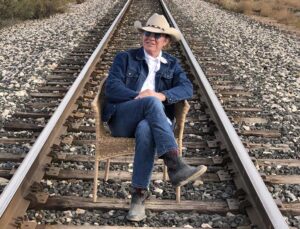In last month’s column, Kris Rutherford kicked off the first of a series about Jimmy Buffett. To read the previous piece, click here.
Summarizing the music of Jimmy Buffett in a few hundred words is akin to partaking of Shakespeare a thimbleful at a time. While it might be argued that Shakespeare has a lasting power that Buffett has yet to prove, Buffett’s body of work has grown over a half-century.
For all his fame, Shakespeare’s activity was spent after just 28 years.
Likewise, both artists dabbled in a variety of arts — Shakespeare in poetry, prose, literature and as a playwright, and Buffett the same. Like Shakespeare, Buffett has written of comedy, tragedy, and most purposefully, self-discovery. But at a basic level, poetry is what connects William Shakespeare to Jimmy Buffett.
To prove my argument: Years ago, I had a college English professor who told me as much.
Music critics in general — a group that has not been a proponent of Jimmy Buffett over the years — have laughed off some of Buffett’s most famous lyrics as nothing more than novelty music. And, to an extent, they are correct.
Much of Buffett’s work falls into what one might consider novelty, comedy or “party” music. “Cheeseburger in Paradise,” “Volcano,” “Gypsies in the Palace,” “Fins,” and “You’ll Never Work in Dis Business Again” have all proven that Buffett is both funny and a happy-go-lucky kind of guy. Even the lyrics of his masterpiece, “Margaritaville,” have a humorous aspect as a one-time vacationer tries to recreate the beach — or the essence of “Margaritaville” — once back home in less humid air.
Still, it’s Buffett’s ability to combine humor with self-discovery that has truly allowed him to master his craft.
An overview of lyrics from some of Buffett’s best-known and little-known songs is like a gentle rain of self-discovery. Take for instance, “Changes in Latitudes, Changes in Attitudes” where, once again, Buffett addresses true life against a background of partying. The opening line, “I took off for a weekend last month just to try and recall the whole year,” offers an idea that what’s to follow will be an introspective song. And it doesn’t disappoint.
Buffett sings of the “places and faces” he’s seen and wonders why they’ve all disappeared. Later he recognizes that reviewing the year may be of little help in his effort to discover if the events have meant anything:
“Yesterday’s over my shoulder,
And I can’t look backward to long.
There’s just too much to see waiting in front of me,
And I know that I just can’t go wrong.”
In between, Buffett reminisces of the freedom he has sought, as well as of how the constant changes in life somehow hold him prisoner.
In what could be considered hindsight’s look at “Margaritaville,” Buffett’s “When the Coast is Clear” isn’t a song that takes him from the coast northward but rather the reverse:
“That’s when it always happens,
The same place every year,
I’ll come down and talk to me,
When the coast is clear.”
In this case, it’s not a matter of longing for the party life on the coast and what “Margaritaville” promises; rather, Buffett is looking at how commercialized the coast has become. As a native of the Gulf Coast, he feels he must escape the area in the summertime. Only when the tourists have left can he get a true sense of the ocean and its ability to help him clear his mind, to heal. After all, while the coast is clear, Buffett admits that he speaks to “Mr. Other Me,” something he yearns for but only occasionally achieves.
Another Buffett song that offers an introspective view on life is “He Went to Paris.” Buffett sings of a man who went to Paris “looking for answers to questions that bothered him so.” The man who takes the trip is young and vibrant, full of potential and has already experienced success. But as he fell for the love affair many have with Paris, he became lost, and “four or five years slipped away.”
With the Paris experience behind him, did the man return home?
No — instead, he went to England, played the piano, and had a family.
“And all of the answers
To all of the questions
Locked in his attic one day.
He liked the quiet
Clean country living,
And twenty more years slipped away.”
Later, we learn the young man went to Paris before World War II and lost his family and half his sight to a war that left him “recalling the answers he never found.” Ultimately, the man finds himself a fisherman on the Gulf Coast, where he recalls after 86 years that “some of it’s magic, some of it’s tragic, but I had a good life all the way.”
Finally, it’s hard to discuss the poetry that pours from Buffett’s pen and guitar without mentioning “A Pirate Looks at Forty.” In a song written about a friend in Key West, Buffett starts the lyrics paying homage to the sea. “Mother, mother ocean, I have heard your call” sets the stage for a journey into a way of life that lives and die on the sea — piracy, in both its modern and historical contexts.
“Watched the men who rode you,
Switch from sail to steam,
And in your belly, you hold the treasures
Few have ever seen,
Most of ’em dream.”
Buffett goes on to admit he’s a pirate — but 200 years too late. And he laments “I’m an over-forty victim of fate arriving too late.” He is also troubled by the fact that he illegally made enough money to buy Miami over the years but squandered it all — it was “never meant to last.”In the end he concludes that his lifestyle, despite all that it brought him, has brought him to a changing point. “I feel like I’ve drowned, gonna head uptown.” So much wasted, and to think the poor fellow has at least half his life left!
We could drone on and on about Buffett’s songs and whether he is a hard partier, a beach bum or a marketing genius. Ultimately though, we’ll wind up having the conversation in some harbor bar somewhere. In fact, if we’re lucky it may be that “One particular harbor, so far and yet so near, where I see the days as they fade away and finally disappear.”
Until next time, remember that even though Jimmy Buffett is a poet, at his core he is singing of the issues everyone faces now and again. He helps explain how much we have left to discover. And in that context, there is no question that his music can easily be categorized as “country.”
Since retiring from a career as an outdoor recreation professional from the State of Arkansas, Kris Rutherford has worked as a freelance writer and, with his wife, owns and publishes a small Northeast Texas newspaper, The Roxton Progress. Kris has worked as a ghostwriter and editor and has authored seven books of his own. He became interested in the trucking industry as a child in the 1970s when his family traveled the interstates twice a year between their home in Maine and their native Texas. He has been a classic country music enthusiast since the age of nine when he developed a special interest in trucking songs.










